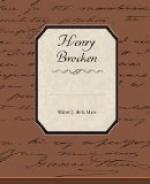XI. LA BELLE DAME SANS MERCI
“O what can ail thee,
knight-at-arms,
Alone and palely
loitering?
The sedge has withered from
the lake,
And
no birds sing.
“O what can ail thee,
knight-at-arms,
So haggard and
so woe-begone?
The squirrel’s granary
is full,
And
the harvest’s done.”
—Keats.
XII. SLEEP AND DEATH
Death will come when thou
art dead,
Soon,
too soon—
Sleep will come when thou
art fled;
Of neither would
I ask the boon
I ask of thee, beloved Night—
Swift be thine approaching
flight,
Come
soon, soon!
—Shelley.
XIII. & XIV. A DOCTOR OF PHYSIC
Well, well, well,—
... God, God forgive
us all!
—Macbeth, Act V., Sc. i.
XV. ANNABEL LEE
I was a child, and she was
a child
In this kingdom
by the sea;
And we loved with a love that
was more than love—
I and my Annabel
Lee—
With a love that the winged
seraphs of heaven
Coveted her and
me.
—Edgar Allan Poe.
XVI. CRISEYDE
... Love hadde his dwellinge
With-inne the subtile stremes
of hir yen.
Book I., 304-5.
Y-wis, my dere herte, I am
nought wrooth,
Have here my trouthe and many
another ooth;
Now speek to me, for it am
I, Criseyde!
Book III., 1110-2.
And fare now wel, myn owene swete herte!
Book V., 1421.
—Chaucer (Troilus and Criseyde).
The traveller
to
the Reader
The traveller who presents himself in this little book feels how tedious a person he may prove to be. Most travellers, that he ever heard of, were the happy possessors of audacity and rigour, a zeal for facts, a zeal for Science, a vivid faith in powder and gold. Who, then, will bear for a moment with an ignorant, pacific adventurer, without even a gun?
He may, however, seem even more than bold in one thing, and that is in describing regions where the wise and the imaginative and the immortal have been before him. For that he never can be contrite enough. And yet, in spite of the renown of these regions, he can present neither map nor chart of them, latitude nor longitude: can affirm only that their frontier stretches just this side of Dream; that they border Impossibility; lie parallel with Peace.
But since it is his, and only his, journey and experiences, his wonder and delight in these lands that he tells of—a mere microcosm, as it were—he entreats forgiveness of all who love them and their people as much as he loves them—scarce “on this side idolatry.”




